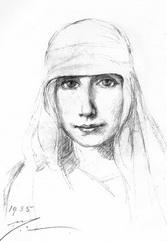Mother (Mirra Alfassa)

Mother was born Mirra Alfassa in Paris in 1878, of an Egyptian mother and a Turkish father. She was a year older than Einstein, and a contemporary of Anatole France, with whom she shared a sense of gentle irony. It was the century of “positivism”; her father and mother were “all-out materialists,” he a banker and a first-rate mathematician, she a disciple of Karl Marx until the age of eighty-eight.
Little Mirra had strange experiences of times past and perhaps of the future; she met Sri Aurobindo “in a dream” ten years before going to Pondicherry and took him for “a Hindu god dressed in the costume of a vision.” Mathematician, painter and pianist, she befriended Gustave Moreau, Rodin, Monet and married a painter whom she later divorced. She then married a philosopher who took her to Japan and China, at the time when Mao Tse-tung was writing “The Great Union of the Popular Masses”, and on to Pondicherry to stay by Sri Aurobindo. For thirty years she lived beside him who at the dawn of the century announced a “new evolution”: “Man is a transitional being.” After his departure in 1950, Mother was left at the head of a huge ashram which seemed to represent all the resistances of the world. She then plunged into the “yoga of the cells” and finally discovered “the great passage” to another species. Alone, surrounded by incomprehension, resistance and ill-will, she left her body in 1973 at the age of ninety-five. “I don't think there ever was anyone more materialistic than I was, with all the practical common sense and positivism,” she would tell me while in the midst of her dangerous experiences in the consciousness of the cells, “and now I understand why it was that way! It gave my body a wonderful base of equilibrium. The explanations I sought were always material; it seemed obvious to me: there's no need for mysteries or anything of the kind — you explain things materially. So I am sure there is no tendency to mystical dreaming in me! Far from it, this body had nothing mystical, thank God!”
Satprem: The Mind of the cels, Introduction,detail
